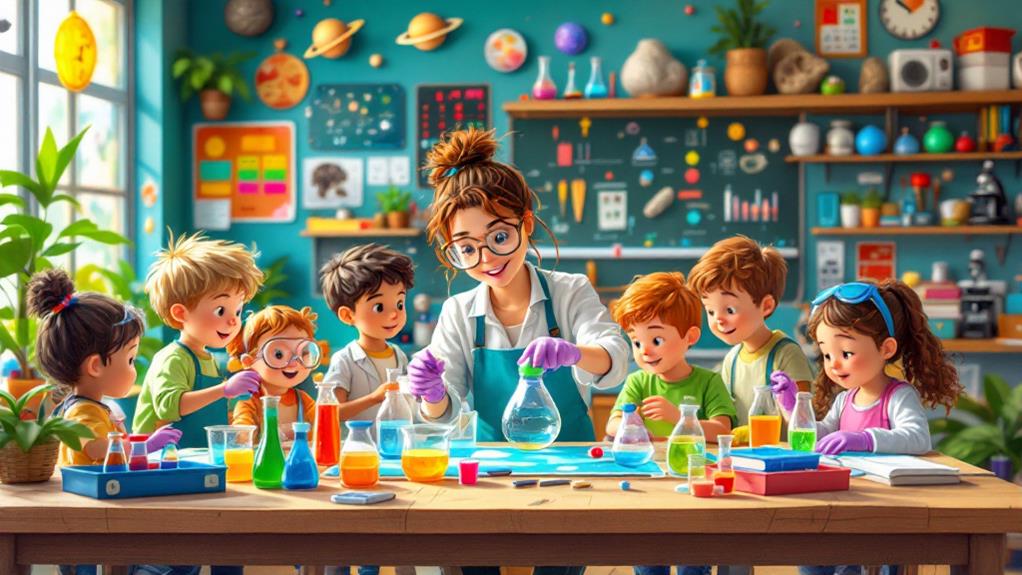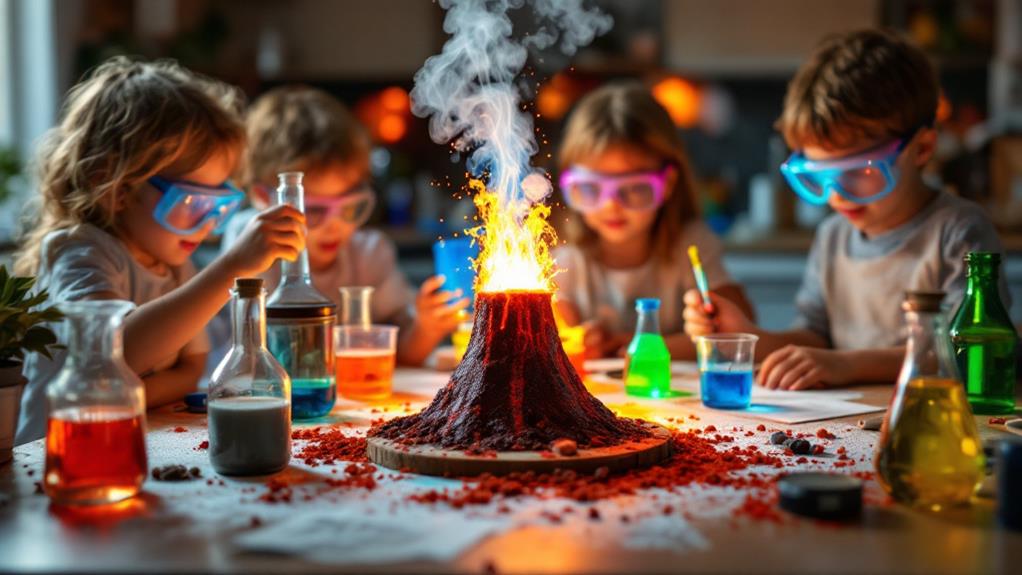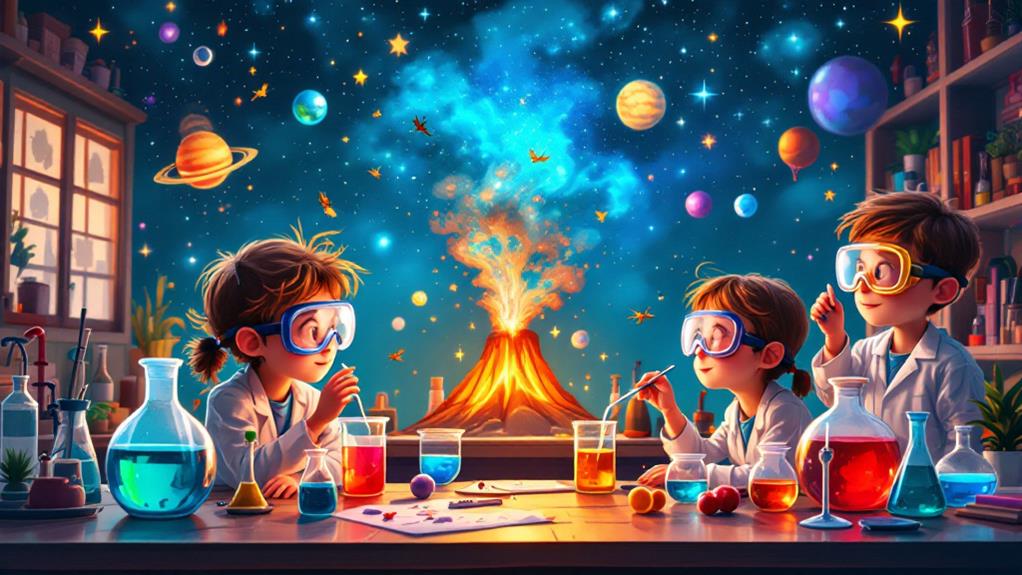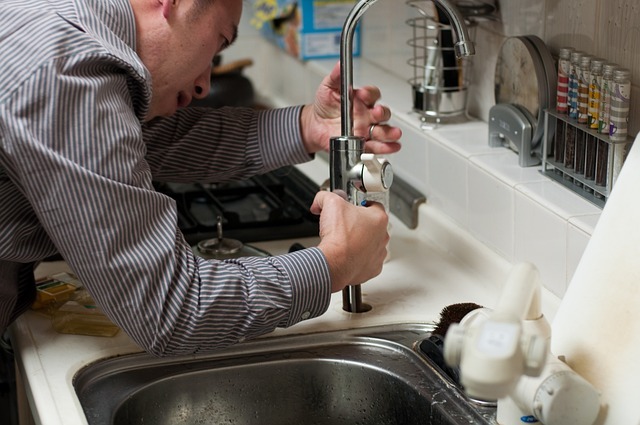How to Get Children Involved in Science: Fun and Educational Ideas

Get your kids excited about science by engaging them in hands-on experiments like kitchen chemistry with baking soda and vinegar or building simple circuits with batteries and bulbs. Head outdoors for nature scavenger hunts, wildlife watching, and stargazing nights to spark curiosity about the world. Use science-themed games and apps to make learning interactive and fun, and choose enchanting books like "The Magic School Bus" for imaginative discovery. Encourage creativity with DIY science projects, such as homemade slime, to teach basic scientific concepts. Investigate these ideas to ignite their passion for science and reveal new possibilities.
Hands-On Science Experiments
Hands-on science experiments are an engaging way to spark curiosity and foster a love for learning in children. By turning everyday activities into scientific revelations, you can make learning exciting and accessible right at home. Kitchen chemistry is a fantastic place to start. You don't need fancy equipment to demonstrate significant scientific principles. Simple ingredients like baking soda and vinegar can create fun and educational reactions. Kids will be fascinated by the fizzy explosion of carbon dioxide when these two common items mix. Explain the chemical reaction happening, and you've turned a simple kitchen activity into a chemistry lesson.
Moving from the kitchen to the living room, you can introduce children to simple circuits using household items. You'll need a few basic supplies like batteries, copper wire, and a small light bulb. Show them how to connect the circuit to light up the bulb. This hands-on activity teaches the fundamentals of electricity and circuitry. Encourage them to experiment with connecting more bulbs or adding a switch to control the light. Regardless of if it's kitchen chemistry or building simple circuits, these experiments provide a solid foundation for future scientific exploration and innovation.
Outdoor Scientific Adventures
Exploring the great outdoors offers countless opportunities for scientific adventures with children. Start with a nature scavenger hunt. Create a list of items like pinecones, specific leaves, or unusual rocks, and let your kids search for them. This not only encourages exploration but also teaches plant identification. You can turn it into a learning moment by discussing each plant's unique characteristics and role in the ecosystem.
Engage in wildlife observation by visiting local parks or nature reserves. Bring binoculars for a closer look at birds and other animals. Encourage your children to note their behaviors and habitats. This activity improves their understanding of biodiversity and the importance of preserving it.
For nighttime fun, plan stargazing nights. Find a spot away from city lights, bring a telescope or just use your eyes, and identify constellations together. Discuss the vastness of space and inspire curiosity about the universe.
Geology hikes are another thrilling adventure. Choose trails with interesting rock formations and discuss their origins. Encourage kids to ask questions and think critically.
Science-Themed Games and Apps

A multitude of science-themed games and apps can captivate children's imaginations while making learning fun. These tools offer an engaging way to investigate scientific concepts right at their fingertips. With interactive science quizzes, kids can challenge themselves and test their understanding of diverse topics. These quizzes often come with instant feedback, helping children learn from their mistakes and celebrate their successes. By turning learning into a game, these apps can motivate kids to plunge deeper into science without feeling like they're studying.
Virtual reality experiences take science exploration to the next level by immersing children in different environments. Imagine your child investigating the solar system, walking on Mars, or plunging deep into the ocean, all from the comfort of your home. These experiences make abstract concepts tangible and unforgettable. By actively participating in these virtual adventures, children can grasp complex scientific ideas more effectively.
When choosing science-themed games and apps, focus on those that encourage critical thinking and problem-solving. Look for apps with suitable content and positive reviews to guarantee they provide both educational value and entertainment. By integrating these tools into your child's routine, you can spark curiosity and foster a lifelong love for science.
Engaging Science Books and Shows
While digital tools offer exciting ways to learn, don't underestimate the power of engaging science books and shows to enthrall a child's interest. Immerse yourself in the expansive domain of science fiction, where imagination meets scientific possibilities. Books like "The Magic School Bus" or "A Wrinkle in Time" can spark curiosity and make complex concepts more relatable. These stories inspire young readers by blending fantastical elements with scientific principles. You can also find science fiction tailored for diverse age groups, ensuring there's always something suitable for your child.
Alongside books, educational documentaries offer a visual feast that expands a child's understanding of the world. Streaming platforms provide access to enchanting series like "Cosmos" or "Our Planet," which investigate the universe and the wonders of nature. These documentaries combine stunning visuals with expert insights, making science accessible and engaging. Watching them together can lead to meaningful discussions and further investigation.
Incorporating science fiction and educational documentaries into your child's routine not only entertains but also lays the groundwork for critical thinking and scientific inquiry. By choosing the right resources, you can nurture a lifelong love for science in your child.
Creative Science Projects at Home

Investigate the world of creative science projects at home and watch your child's curiosity ignite. There's no need for complicated equipment; you can use DIY science kits or even everyday items found in your kitchen. These projects are not only educational but also a fun way to spend time together.
Start with kitchen chemistry—it's a great way to introduce scientific concepts. You can create a simple volcano using baking soda and vinegar. Watch as your child learns about chemical reactions while having a blast! Another idea is to make homemade slime, which teaches about polymers. Just mix glue, baking soda, and contact lens solution, and let the fun begin!
If you're looking for something more structured, consider DIY science kits. They often include everything you need for multiple experiments, covering topics like physics, biology, and more. These kits usually come with easy-to-follow instructions, making it simple for you and your child to plunge into the world of science.



